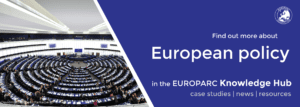Celebrate the Earth Day 2021: Restore our Earth!
Cetatile Ponorului portal, Apuseni Nature Park. Photo: Coras Florin
Earth Day is celebrated every year on 22 April. This year, the theme is “Restore Our Earth“. Find out how you can participate in the global celebration of our planet and read about the latest developments in the EU debate on a future restoration law.
Join the Earth Day celebrations!
On this Thursday, April 22, the theme of the yearly World Earth Day celebration is “Restore our Earth”, which focuses on natural processes, emerging green technologies, and innovative thinking that can restore the world’s ecosystems.
To celebrate this Earth Day, let’s focus on what each of us can do to address climate change. Next to large-scale mitigation and adaptation strategies, it is up to each and every one of us to take part in Restoring Our Earth – not only because we care about the natural world, but because we need it. People all around the world depend on a healthy Earth to support their jobs, livelihoods, health and happiness.
A healthy planet is not an option — it is a necessity.
Acknowledging and promoting the importance of healthy nature is one of the cornerstones of EUROPARC’s work. Therefore, we invite everyone across our network and beyond, to be part of this Earth Day and to help further climate action and nature restoration across the globe.
How can you take action?
Get inspired by just a couple of ideas on how to better connect with our planet and celebrate it on this Earth Day (and any other day):
- organise or participate in a local cleanup;
- educate yourself and the others about climate and the environment;
- engage in a citizen science initiative, for example through the Global Earth Challenge;
- use #RestoreOurEarth on social media to inspire others;
- stay informed and engaged in public debates, for example…
EU Nature Restoration Targets
It is no news that action is needed to bring back healthy nature by restoring degraded ecosystems, to improve their resilience and turn the tide against biodiversity loss. That is why in the framework of the EU’s Biodiversity Strategy for 2030, the Commission is now working on legally binding EU nature restoration targets.
To learn more about the restoration law, read the Position Paper Restoring EU’s Nature, a document agreed by environmental NGOs including the EUROPARC Federation, WWF and many others.
The new restoration law will need to achieve concrete and measurable results, since what has been done so far has not been sufficient and only with limited impact. However, the final form and real impact will be dependent on member states, who will develop national plans for implementation.
Nature restoration is a priority in the Biodiversity Strategy for 2030. Therefore, it cannot be seen in isolation from the Strategy and other environmental policies. Since the new law will concern restoration within and outside Protected Areas and Natura 2000, there is an important role to play for our members.
EUROPARC is following closely the debate with the European Commission, member states and other NGOs. We are keen to collect views and opinions of our members!
During the European Commission (EC) intervention that took place on 14 April, 3 main considerations were discussed:
- Restored areas should not degrade again. It is necessary to ensure that the investments made are long-lasting and worth. One way to do that is to designate restored areas as Protected Areas. Once designated as Protected Areas, these would contribute to the 30% targets under the Biodiversity Strategy.
- Need to acknowledge links with Natura 2000 areas. These areas require obligation to satisfy specific conservation objectives, which might include (depending on the needs on local level) restoration targets such as improving conservation or recreation of the area.
- Need to consider passive restoration (especially in the marine environment it is known as the most cost-effective way of recovering ecosystems).
Follow the debate with EUROPARC!
Although the legislative procedure is in its early stage, EUROPARC welcomes the initiative and sees its crucial role for Protected Areas and healthy nature. For the upcoming development of this debate, we especially emphasise the need to make sure restoration measures are coherent with the rest of nature conservation actions and policies.
Download the presentation of the European Commission from the meeting on 13 April to learn about the current state of play and next steps in the process.
An exchange with the EC on this topic is planned for the upcoming Seminar Dialogue in June 2021. Additionally, we have foreseen a dedicated workshop at the Conference in October.
Please contact federico.minozzi@europarc.org to share any inputs and views on this topic.
